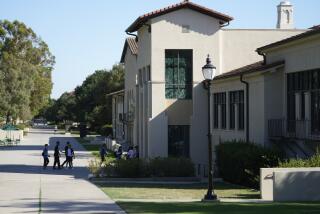Oxy Posts $2-Billion Loss, Cites Expected Restructuring Cost
- Share via
Occidental Petroleum Corp., the nation’s sixth-largest energy company, on Wednesday reported a net loss of $2 billion in the fourth quarter of 1990, reflecting a massive but expected onetime charge for the company’s ambitious restructuring program.
Without the charge, Occidental would have reported quarterly net income of $45 million, up 50% from 1989, owing mainly to increased oil and gas earnings due to the high prices generated by the Persian Gulf crisis.
Wall Street apparently focused on that comparison, rather than the huge, onetime loss. Los Angeles-based Occidental’s stock closed up 37.5 cents at $18.125 a share Wednesday in trading on the New York Stock Exchange.
“The real world is, what did the company do on an ongoing basis?” said Andrew Gray III, an industry analyst at Pershing & Co. in Jersey City, N.J. “And if you eliminate the effects of the restructuring . . . it’s actually better than expected.”
In the fourth quarter ended Dec. 31, Occidental reported a net loss of $2.001 billion, or $6.77 a share, contrasted with net income of $30 million, or 10 cents a share, in the same quarter a year earlier. Quarterly sales were $6.063 billion, compared to $5.049 billion a year earlier.
The quarterly results included a $2.046-billion after-tax charge for restructuring costs. Analysts had been told to expect the charge in a meeting earlier this month with new Occidental Chairman Ray R. Irani, who took over when company patriarch Armand Hammer died in December.
The charge was spread among the company’s operating divisions, and also included $363 million to cover the costs of severance payments, litigation and other unspecified items.
The restructuring includes a cut in the dividend--long maintained at a level that analysts considered unjustifiable--sales of unprofitable or non-strategic assets and writeoffs of idle properties. All the steps are designed to cut debt, improve cash flow and focus the company on its core oil, gas and chemicals businesses.
For the year, Occidental reported a net loss of $1.695 billion, or $5.82 a share, contrasted with net income of $285 million, or $1.03 a share, the year before. Sales in 1990 were $21.694 billion, up from $20.068 billion in 1989.
Without the restructuring charge, net income would have risen 23% to $351 million in 1990, the company reported.
Aside from the restructuring charge, the fourth-quarter results included a onetime loss of $23 million from a federal tax change, and onetime charges of $21 million from the settlement of oil and gas litigation and $45 million for environmental costs. The results also included a onetime gain of $19 million from asset sales.
Operating income was up dramatically at the company’s oil and gas division, but fell at its key chemical operation. Operating earnings were also higher at Occidental’s MidCon Corp. gas pipeline company, its IBP Inc. meat processing company and its Island Creek Corp. coal division.
Oil and gas earnings, not counting the restructuring charge, were $124 million in the quarter, nearly a tenfold increase over 1989’s $13 million. Restructuring charges in the division were $535 million, reflecting the writedown in the value of Occidental’s investment in properties in Peru and elsewhere.
Chemical earnings, not counting the restructuring charge, were down 41% to $126 million from $214 million in 1989, due mainly to the higher cost of feedstocks, another consequence of the Middle East crisis.
Restructuring charges for the chemical division amounted to $848 million for the writedown of chemical plants and the costs of cleaning up chemical waste sites. The latter include the notorious Love Canal in New York, which Occidental inherited in its purchase of Hooker Chemical Co. in 1968.
BACKGROUND Until his death at age 92 last month, Occidental Petroleum Corp.’s longtime chairman, Armand Hammer, put his personal imprint on the Los Angeles-based energy firm. While turning Occidental into the nation’s sixth-largest oil company, Hammer also ran up a huge level of debt, kept in place a dividend that exceeded the company’s profits and got the company involved in businesses as varied--and as unrelated to energy--as beef processing, horse breeding and hotel management. When Ray R. Irani, Hammer’s hand-picked successor, took over, he quickly mapped out a plan to sell unprofitable assets, lower debt, improve cash flow and focus Occidental on its core businesses: oil, gas and chemicals.
More to Read
Inside the business of entertainment
The Wide Shot brings you news, analysis and insights on everything from streaming wars to production — and what it all means for the future.
You may occasionally receive promotional content from the Los Angeles Times.










